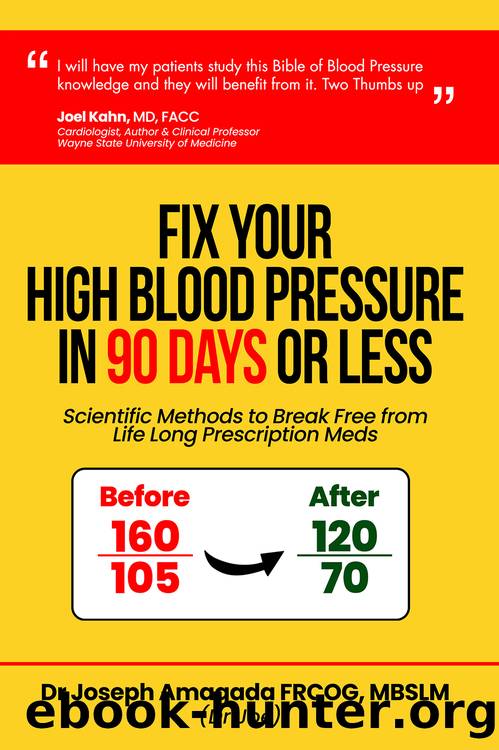Fix Your High Blood Pressure in 90 Days or Less by Dr Joseph Amagada MD

Author:Dr Joseph Amagada MD
Language: eng
Format: epub
Publisher: Pathfinder Publications Ltd
DHA and EPA are obtainable from fish sources. Usually oily fish like mackerel, herring, salmon, oysters, anchovies, sardines etc. hence both DHA and EPA are called marine omega 3s. ALA is available from plant sources like walnuts, flax seeds, flax seed oil, other nuts, chia seeds etc. The problem though is the body does not use ALA directly. ALA needs to be converted to either DHA or EPA for our body to utilise it properly. EPA and DHA are longer chain omega 3 fatty acids, and our body seems to prefer the longer chain omega 3 fatty acids to meet its needs. Sadly, the conversion output is poor. Below 5% conversion is suggested by studies119. Only a small percentage of ALA is converted to EPA which is unfortunate. Worse still is that conversion of ALA to DHA is worse than conversion to EPA although gender differences exist120. Men have a rougher ride with the conversion. Women win the battle of conversion here probably because of the influential oestrogen hormone121. What happens to the rest of the ALA we eat then, if only a small percentage of it is converted into EPA and DHA? Well, youâll be glad to know that the unconverted ALA isnât wasted; it is processed into energy instead.
Do omega 3 fatty acids have an influence on blood pressure reduction? There is evidence that they do. We know from earlier that DHA and EPA are the two fatty acids the body prefers to utilise, right? Well, this meta-analysis122 pooled a number of randomised controlled trial studies together and examined the effect of EPA and DHA without upper dose limits â and including food sources â on blood pressure.
The study found a very modest reduction of blood pressure in people who did not have high blood pressure. Even better news is that EPA and DHA did reduce blood pressure a little bit more in people who had high blood pressure and werenât on treatment. A 4.5 mmHg drop in systolic blood pressure reading (upper value) and an average of 3 mmHg reduction in the bottom value (diastolic). Remember these were untreated individuals. I should point out that doses of more than 2 gm are required to see reductions of diastolic blood pressure. A similar study123 looked at using 1 gm/day of EPA and DHA for cardio-protection and higher doses for blood pressure reduction.
The point here for the strict vegan is that the ALA you consume may not be enough to supply adequate amounts of EPA and DHA which our body prefers to use because of the poor conversion rate. This translates to potential omega 3 deficiency even though you may be consuming enough ALA from your diet. You could, of course, get your EPA and DHA from supplements, or you could be flexible in your dietary approach as a plant-based eater by including oily fish in your portfolio in order to get those two fatty acids directly from their natural sources. Just a thought.
Do plant-based diets provide blood pressure reduction benefits? Of course, they do and there is plenty of evidence to support this.
Download
This site does not store any files on its server. We only index and link to content provided by other sites. Please contact the content providers to delete copyright contents if any and email us, we'll remove relevant links or contents immediately.
Men In Love by Nancy Friday(5239)
Everything Happens for a Reason by Kate Bowler(4742)
The Immortal Life of Henrietta Lacks by Rebecca Skloot(4587)
Why We Sleep by Matthew Walker(4441)
The Sports Rules Book by Human Kinetics(4385)
Not a Diet Book by James Smith(3422)
The Emperor of All Maladies: A Biography of Cancer by Siddhartha Mukherjee(3162)
Sapiens and Homo Deus by Yuval Noah Harari(3071)
Day by Elie Wiesel(2782)
Angels in America by Tony Kushner(2661)
A Burst of Light by Audre Lorde(2604)
Endless Forms Most Beautiful by Sean B. Carroll(2482)
Hashimoto's Protocol by Izabella Wentz PharmD(2374)
Dirty Genes by Ben Lynch(2317)
Reservoir 13 by Jon McGregor(2302)
And the Band Played On by Randy Shilts(2206)
Wonder by R J Palacio(2206)
The Immune System Recovery Plan by Susan Blum(2058)
Stretching to Stay Young by Jessica Matthews(2045)
